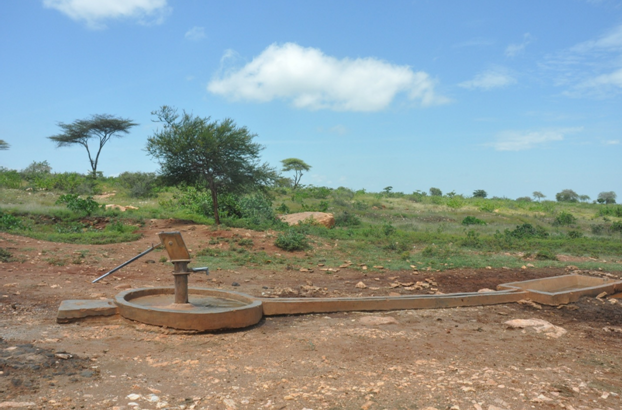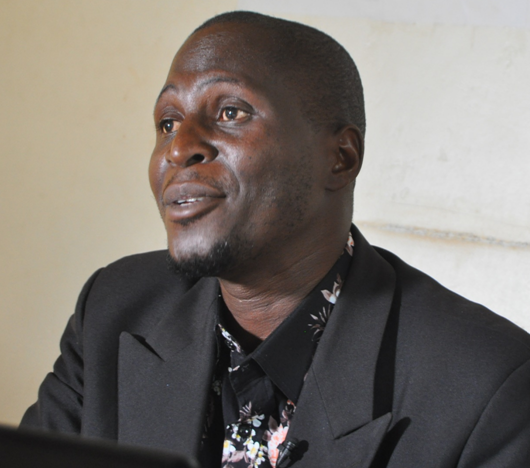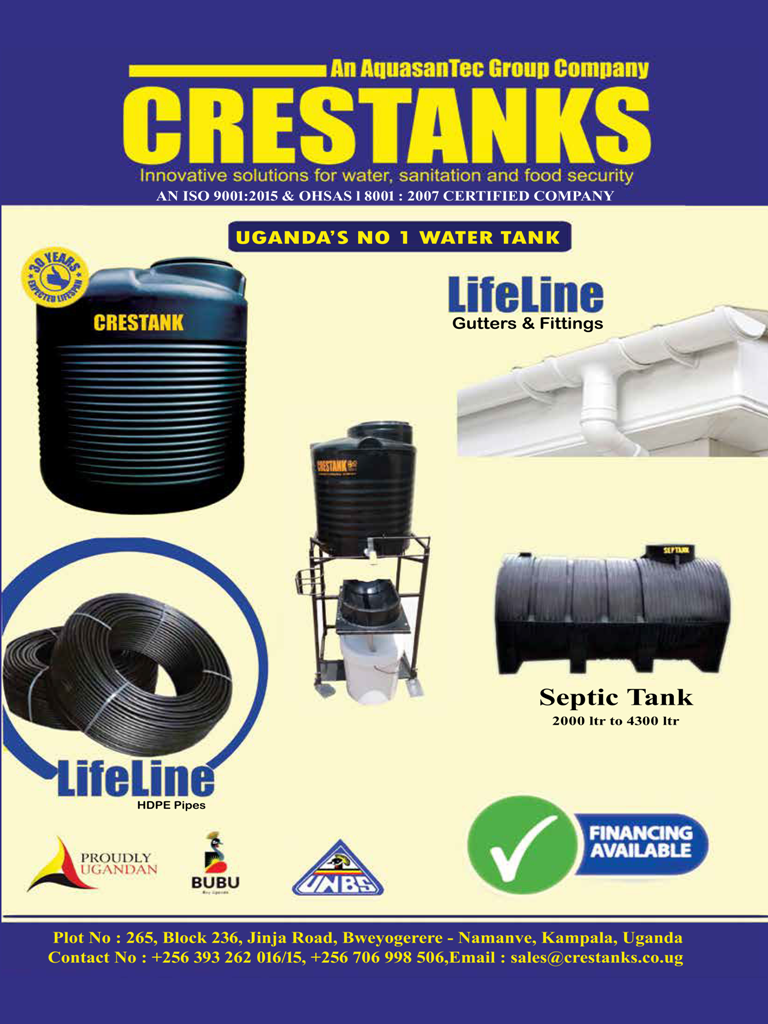Acholi region
Safely managed water, sanitation, and hygiene (WASH) services are an essential part of preventing and protecting human health during infectious disease outbreaks, including the current COVID-19 pandemic.
This is because good WASH and waste management practices, which are consistently applied, serve as barriers to human-to-human transmission of the COVID-19 virus in homes, communities, health care facilities, schools, and other public spaces.
Investing in core public health infrastructure, including water and sanitation systems is primarily a key cost-effective strategy in increasing pandemic preparedness, especially in resource-constrained settings.
However, one of the challenges of public health in Acholi region is the state of WASH in the many public and private health facilities.
Compounded by the outbreak of the COVID-19 pandemic, access to safe water, maintenance of water points in health facilities and the availability of sanitation services, especially toilets and physical access to toilets as well as sanitary conditions in the toilets at health facilities across Acholi region is yet questionable.
The wanting situation is evidence of the dilemma patients who visit these facilities every day go through in accessing hygiene and sanitation facilities.
In Agago district of East Acholi region, for example, Patongo Health Centre III, Lukole Health Centre II as well as Omot Health Centre II were sampled and did not have sufficient facilities in place to manage the situation.
Whereas frequent and proper hand hygiene is one of the most important measures that can be used to prevent infection with the COVID-19 virus, the two handwashing facilities that were positioned at both Lukole and Omot Health centres had some water inside them but did not have soap or hand sanitisers for washing.
Even when patients crowded at the veranda to wait for services, the surrounding of the handwashing facilities remained dry by 11:40am, evidence that the patients entered and exited the facility without washing or disinfecting their hands.
Just like Omot and Lukole facilities that had broken boreholes which were yet to be repaired, many health facilities in the district also lacked running water. The water systems in these facilities were found to be broken down while others simply lacked it by design.

Health workers at the above facilities could not cooperate to comment on how they were handling the challenges but Ms. Hellen Drajea Iraku, the Agago assistant district health officer in charge of maternal and child health, said that of the 41 health centres in the district, 52% of them did not have running water.
According to her, even facilities with boreholes, some were non-functional while others had poor quality water.
“In case pregnant mothers come to deliver, the attendants are required to travel long distances to fetch water from streams, protected springs, and wells. Due to this, mothers opt to deliver from home,” Iraku said.
It becomes hard for a medical facility to prevent the spread of some infections in the absence of clean and safe water during the pandemic since it is essential during maternity sessions and the safety of mothers.
“We have been reporting this concern to the district technical planning committee, but the amount of money given to the water department is too low to cater for our demand,” Iraku added.
By March 31, 2021, according to the Water and Environment ministry, clean water access rates in Agago varied from 95 % in Lokole sub-county to 95 % in Lokole sub-county.
Agago has 1,364 domestic water points which serve 239,036 people – 208,404 in rural areas. The district, however, with only two piped water schemes, has 319 water points that have remained non-functional for over five years and are considered abandoned.
“Safely managed WASH services are critical not only now but also during the recovery phase of a disease outbreak to mitigate secondary impacts on community livelihoods and wellbeing,” Iraku said.
If not managed, secondary impacts may most likely increase the risk of further spreading the water-borne diseases, including potential disease outbreaks such as cholera, particularly where the disease is endemic, “and this is why we must act,” she added.
In an interview, Mr. Andrew Onyuk, the Agago Resident District Commissioner, said despite the challenges currently faced by the district, the leadership was striving to advocate for the establishment and maintenance of the established Standard Operating Procedures.
“It would be unreasonable to say there is enough water supply or there are no challenges. We have many of them but we are restless to try and tackle them by engaging all the active development partners in the district. Last week I was in Arum sub-county to launch several protected wells establishment with the support of GOAL, a local NGO here,” he said.
According to Onyuk, Arum had remained one of the severely hit areas with limited safe water access.
“At our health facilities, there are equal challenges but whatever we are receiving from the government we are emphasizing that they are equitable and effectively used to benefit the communities during the pandemic,” he added.
Whereas there are handwashing gears put in place in all health facilities, Onyuk said the district taskforce discovered that supplies of associated requirements such as soap, sanitisers, facemask, etc., get depleted before the planned period due to the many users.
To quantify the extent of the problem, the district health department in 2020 recorded a 39% and 48% in hygiene, and sanitation and health management ranking respectively in their WASH report.
In Lamwo district, the situation was recently improvised with the intervention of the Office of the Prime Minister’s Development Response to Displacement Project (DRDIP) programme that equipped learning and health facilities in all sub-counties harboring refugees with sanitation and hygiene facilities.
Mr Richard Omoya is the LC1 chairman for Lakwa village, neighboring Palabek Health Centre III in Palabek-kal sub-county in Lamwo district.
He recalls how antenatal care service at the facility was suspended for two weeks due to lack of hygiene and sanitation facilities. There was also fear that the roof of the maternity ward would collapse on expectant mothers who come for their routine antenatal visits.
According to Omoya, services later resumed after shifting to a new and better location with access to clean but safe water. The facility’s theatre with adequate water supply was instead turned into the maternity ward.
“The health unit management sat down and it was decided that the facility’s theatre is turned into a maternity ward. To date, the maternity ward has not been repaired for use despite lobbying for its repair or construction of a new one,” Omoya said.
Francis Okumu, the in-charge, said the facility had become vulnerable to pressures exerted by the huge number of refugees.
“We are very vulnerable right now; a lot is lacking here to handle the big numbers. There is no substantial laboratory, not even a morgue to handle dead bodies, and worst of all, there is an acute shortage of water here that has forced us to use only pit latrines,” Mr. Okumu said.
Due to lack of water and associated facilities, Palabek Health Centre III still uses pit latrines instead of water-borne toilets, something that could further spread infections among patients, health workers and the communities neighboring the facility.
Palabek Health Centre III receives and serves averagely 150 patients per day, with the majority being South Sudanese refugees residing in the nearby Palabek-ogili and Palabek-kal refugee settlements.
The number (of patients) sums to more than 115,000 per month, more than the average of both Kitgum General Hospital and St. Joseph Hospital. It is established that the two facilities sitting in Kitgum town receive 220,000 patients combined, per month.
A year ago, the government commenced the construction of five housing units at the health facility under DRDIP implemented under the Office of the Prime Minister (OPM).
Relief and Disaster Preparedness minister Hilary Onek, also Lamwo County MP, said that government remains committed to improving the state of the facility under the DRDIP programme in order to save it from the pressure arising from the presence of refugees in the area.
“These facilities should be put to best use. I do not wish to hear that patients are abandoned because the health workers are arriving late and leaving too early because they are commuting from far places,” Mr. Onek said.
DRDIP is a regional project focusing on addressing the impacts of the protracted presence of refugees on the hosting communities from the four countries of Djibouti, Ethiopia, Kenya, and Uganda.
West Acholi situation
Just like East Acholi, the situation in the west is no different.
In the Gulu district 2020 maternity scorecard -WASH audit report, only four health facilities (Lacor Hospital, Layibi Health Center III, Aywee Health Centre III and Cwero Health Centre III scored above the passing marks while Gulu referral hospital and six other facilities assessed, failed to reach the scores).
Whereas Gulu referral hospital has 89% water access, it scored 46% in the health care waste management and 00% in cleaning and administration, raising several questions on the state of hygiene at the maternity unit of the facility.
Five health centre IIIs scored 00% in clean water access in their facilities. These were; Laroo Health Centre III in Laroo division, Cwero Health Centre III, Pabwor Health Centre III, Patiko Health CentreeIII, and Awach health center III.
Meanwhile Patiko, Pabwor, and Angaya Health Centre IIIs only had 17% bathing facilities for patients whereas Awach, Bardege, Patiko, and Pabwor Health centres scored less than 35% in wastes disposal each.
Only Lacor Hospital, a private-owned facility scored 60% in cleaning and hygiene while the rest of the health facilities in the district, including Gulu referral hospital scored less than 20%.

Mr.Yoweri Idiba,Gulu DHO
In the same year’s health facility WASH audit ranking for Gulu district, water access stood at an average of 46%, hygiene at 40%, and sanitation and health management at 44%.
Mr. Yoweri Idiba, the Gulu DHO, said improving the district’s WASH ranking was still lacking the integrated support of the community, adding that funding received by the district was always inadequate to support planned activities per financial year.


















